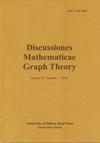论图积的k独立数
IF 0.8
4区 数学
Q3 MATHEMATICS
引用次数: 1
摘要
图的k独立数αk(G)是在两两距离上大于k的顶点集合的最大大小,或者是第k次幂图Gk的独立数。虽然已知αk(G) = α(Gk),但一般来说,这并不适用于大多数图积,因此不能使用图积的α的现有界。本文给出了若干图积的k无关数的明显上界。我们特别关注笛卡尔积、张量积、强积和词典积。以前在文献中已知的k = 1的一些界限是我们主要结果的推论。本文章由计算机程序翻译,如有差异,请以英文原文为准。
On the k-Independence Number of Graph Products
Abstract The k-independence number of a graph, αk(G), is the maximum size of a set of vertices at pairwise distance greater than k, or alternatively, the independence number of the k-th power graph Gk. Although it is known that αk(G) = α(Gk), this, in general, does not hold for most graph products, and thus the existing bounds for α of graph products cannot be used. In this paper we present sharp upper bounds for the k-independence number of several graph products. In particular, we focus on the Cartesian, tensor, strong, and lexicographic products. Some of the bounds previously known in the literature for k = 1 follow as corollaries of our main results.
求助全文
通过发布文献求助,成功后即可免费获取论文全文。
去求助
来源期刊

Discussiones Mathematicae Graph Theory
MATHEMATICS-
CiteScore
2.20
自引率
0.00%
发文量
22
审稿时长
53 weeks
期刊介绍:
The Discussiones Mathematicae Graph Theory publishes high-quality refereed original papers. Occasionally, very authoritative expository survey articles and notes of exceptional value can be published. The journal is mainly devoted to the following topics in Graph Theory: colourings, partitions (general colourings), hereditary properties, independence and domination, structures in graphs (sets, paths, cycles, etc.), local properties, products of graphs as well as graph algorithms related to these topics.
 求助内容:
求助内容: 应助结果提醒方式:
应助结果提醒方式:


